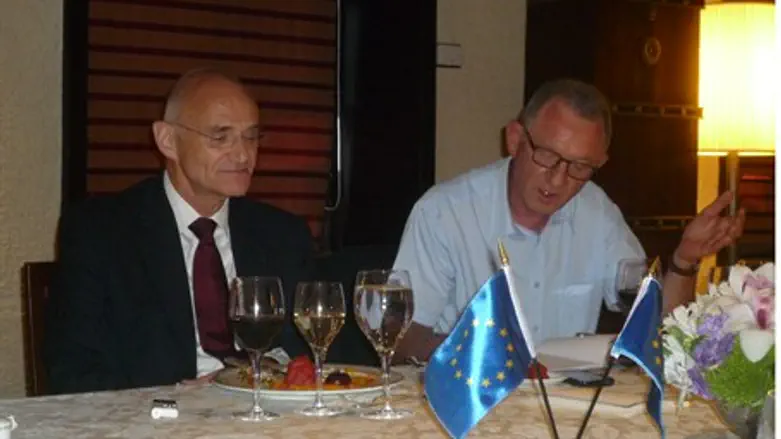
Who said there are no free lunches? The nationalist press enjoyed a free lunch at the King David Hotel with Ambassador Andrew Standley, head of the EU delegation to Israel, who was ably assisted in translation duties by David Kriss.
This is part of an effort begun a few years ago by the EU to try to make contact with segments of Israeli public opinion who take a highly critical view of the EU.
Ambassador Standley tried to emphasize that there are many areas of the EU relationship with Israel, one of which is trade and agreements such as the recently signed "Open Skies" aviation agreement.
Despite the severe economic downturn in Europe, trade relations between the EU and Israel bucked the trend and represented 30% of Israeli trade.
In response to a question on anti-Semitism within the union, the ambassador requested not to judge Europe by a few noisy voices and his opinion, as Israeli Remembrance Day approached, was that Europe was solicitous over Israel's security. The EU is not anti-Israel and views the two state solution as the best way out.
These comments could not conceal the very deep disagreement on the topic of Jewish communities in Judea and Samaria, where the ambassador enunciated the familiar European position.
What came as an unpleasant surprise was his statement that the EU still considered Gaza occupied, since Israel controlled entry despite the open border.
Another point of contention concerned the negotiations with Iran, where the ambassador was much more optimistic about a breakthrough than his questioners.
The Ambassador stressed the Barcelona-based Union for the Mediterranean that allows Israel to interact with Arab countries. Journalists questioned him over the importance of the Mediterranean Union, given Tunisia's decision to incorporate into its constitution a clause barring a peace agreement with Israel - and the incident in Morocco involving the Israeli representative to the forum, who was forced to flee for his life.
Those present went a few rounds with the ambassador who was not going to deviate from official policy.
What proved more interesting were responses about the situation in Europe. Here Ambassador Standley was very candid in calling the situation the worst crisis since the formation of the EU. He conveyed the sense of frustration with the oscillations, from a feeling that the worst was over to a renewed sense of crisis with Spain, now in the crosshairs as interest rates on Spanish debt approach the danger point.
He stood up for the policy of defending the banking system and then tackling sovereign debt, refusing diplomatically to endorse either the austerity or growth positions, but expressed his hope that a balance would be found.
The Ambassador acknowledged that the hard times had allowed national stereotyping to reemerge at a time that Europe had to pull together.